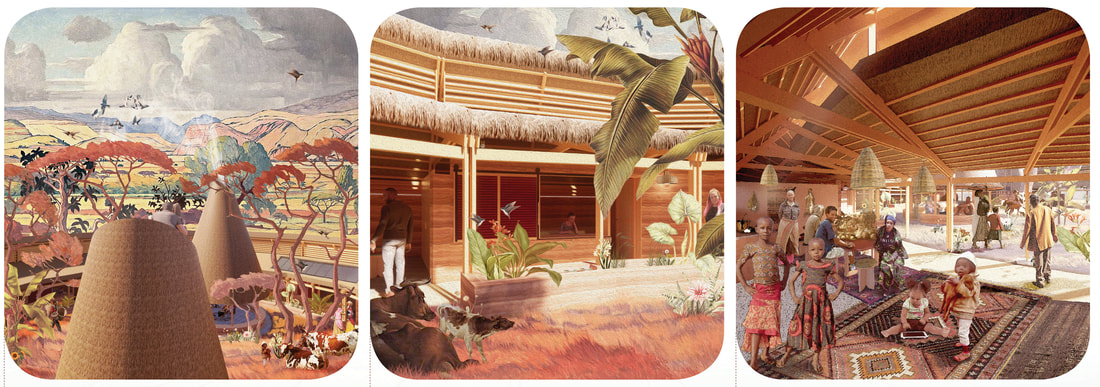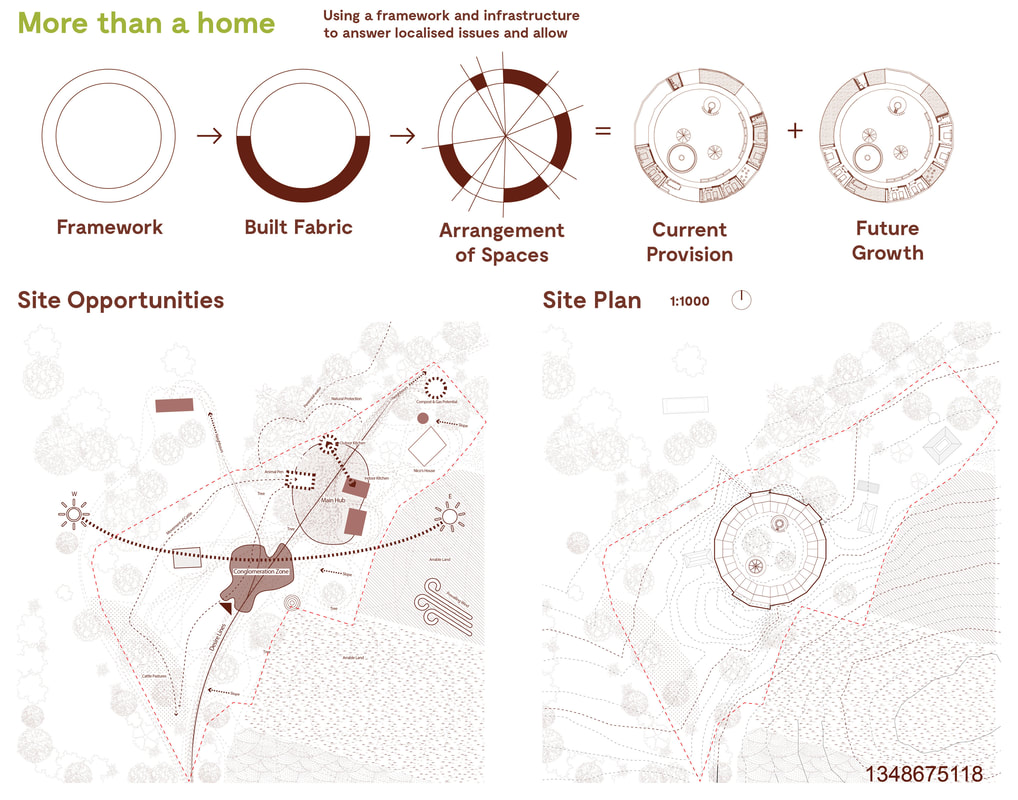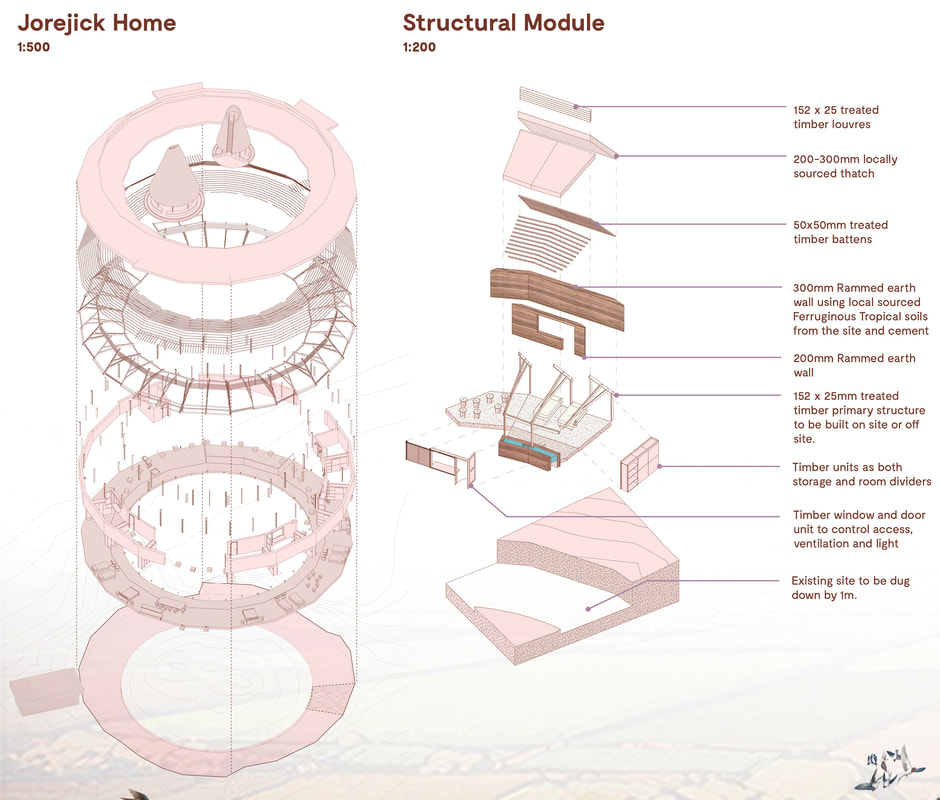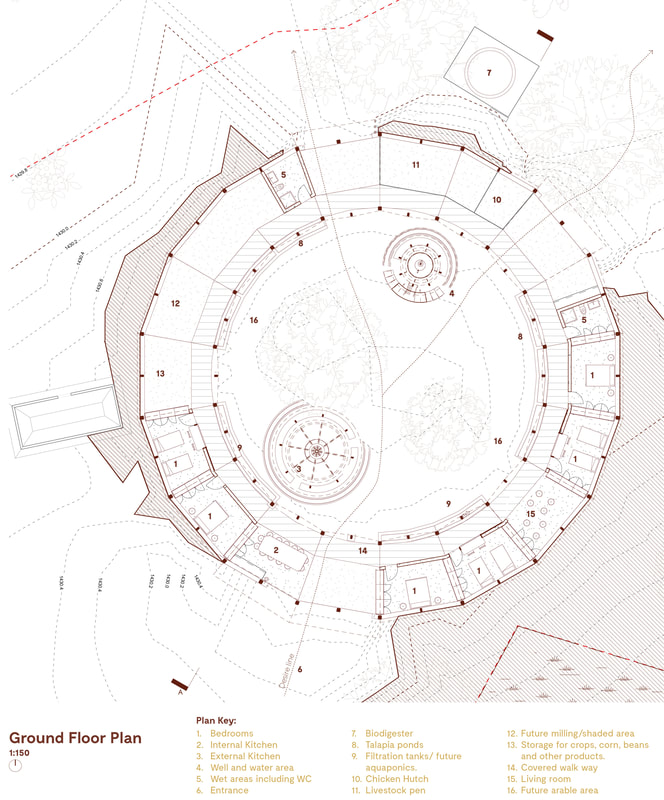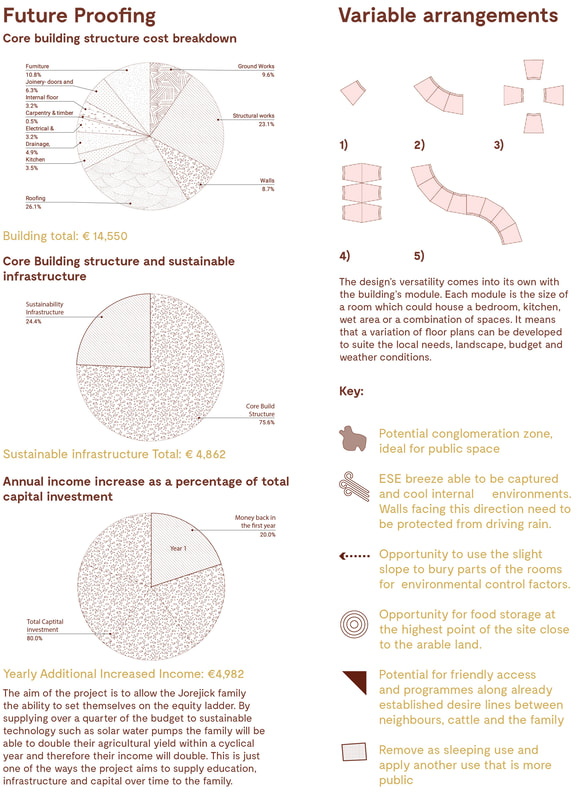SPECIAL HONORABLE MENTION
[Aleksandar Stojakovic, Alexander Frehse, Lloyd Martin]
LONDON, UNITED KINGDOM
At the core of our design proposal is the belief that this project should not only build a home for the Jorejick family now, but also provide a framework for sustainable future growth, both spatial and economic.
To support this vision, we propose that the budget be deployed across three categories:
1. Core built structure
2. Investment in additional sustainable technologies and infrastructure
3. Education and upskilling of family members to use sustainable infrastructure
We have designed Ukuaji as a home that can adapt and evolve as the family does. Its modular design provides all the spaces the family currently requires, while leaving room within the framework for future development.
Replicating the historical Iraqw sunken earthen home, we have limited the external wall areas exposed to driving rain and sun, whilst improving the thermal inertia capabilities, and used passive lighting, cooling and heating, taking cues from the project’s immediate cultural surroundings.
The design achieves this using just 75% of the total budget, leaving 25% available for investment in sustainable technologies, and for education and upskilling.
While even the core building structure would offer significant lifestyle improvements, investment in sustainable technologies across the site will make this project truly transformational.
A biodigester offers a simple, sustainable solution to the problem of human waste disposal, and will produce gas which can be used for cooking, so reducing family bills.
An integrated photovoltaics system provides the family with a clean, green source of electricity, independent of the grid. It reduces the family’s reliance on kerosene - a major source of illness.
A solar pump increases efficiency of access to well water and will dramatically improve irrigation systems, leading to much higher crop yields.
A tilapia farm, supported by an aquaponic system using rainfall capture, will provide the family with a source of protein for their diet, as well as an additional source of income.
And in the kitchen, an underground cool storage facility means the family can store food up to 5 times longer, all but eliminating the problem of food spoilage.
We estimate the annual economic benefit to the family of these interventions at approximately 4000€.
Ukuaji is a holistic design solution to house and support the family system, catalysing economic development and leaving room for spatial growth.
With its modular design, Ukuaji could be transposed and adapted for other rural or urban settings in Tanzania, offering a sustainable solution to the country’s housing crisis.
To support this vision, we propose that the budget be deployed across three categories:
1. Core built structure
2. Investment in additional sustainable technologies and infrastructure
3. Education and upskilling of family members to use sustainable infrastructure
We have designed Ukuaji as a home that can adapt and evolve as the family does. Its modular design provides all the spaces the family currently requires, while leaving room within the framework for future development.
Replicating the historical Iraqw sunken earthen home, we have limited the external wall areas exposed to driving rain and sun, whilst improving the thermal inertia capabilities, and used passive lighting, cooling and heating, taking cues from the project’s immediate cultural surroundings.
The design achieves this using just 75% of the total budget, leaving 25% available for investment in sustainable technologies, and for education and upskilling.
While even the core building structure would offer significant lifestyle improvements, investment in sustainable technologies across the site will make this project truly transformational.
A biodigester offers a simple, sustainable solution to the problem of human waste disposal, and will produce gas which can be used for cooking, so reducing family bills.
An integrated photovoltaics system provides the family with a clean, green source of electricity, independent of the grid. It reduces the family’s reliance on kerosene - a major source of illness.
A solar pump increases efficiency of access to well water and will dramatically improve irrigation systems, leading to much higher crop yields.
A tilapia farm, supported by an aquaponic system using rainfall capture, will provide the family with a source of protein for their diet, as well as an additional source of income.
And in the kitchen, an underground cool storage facility means the family can store food up to 5 times longer, all but eliminating the problem of food spoilage.
We estimate the annual economic benefit to the family of these interventions at approximately 4000€.
Ukuaji is a holistic design solution to house and support the family system, catalysing economic development and leaving room for spatial growth.
With its modular design, Ukuaji could be transposed and adapted for other rural or urban settings in Tanzania, offering a sustainable solution to the country’s housing crisis.

